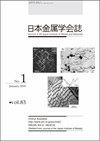CALPHAD方法中热空位的描述
IF 0.4
4区 材料科学
Q4 METALLURGY & METALLURGICAL ENGINEERING
引用次数: 1
摘要
在calphad型热力学评估中,固体中的热空位没有得到明确的处理,因为人们认为它们对吉布斯能的贡献是有限的,即使在熔点也是如此。然而,空位分数对于动态模拟是必要的,例如沉淀和扩散过程。本文提出了一种在calphad型评估中设置参数的方法,以重现纯金属和固溶体中热空位的温度依赖性。本文章由计算机程序翻译,如有差异,请以英文原文为准。
Description of the Thermal Vacancies in the CALPHAD Method
Thermal vacancies in solids have not been treated explicitly in the CALPHAD-type thermodynamic assessments because it was considered that their contributions to the Gibbs energy were limited, even at the melting point. However, the vacancy fraction is necessary for dynamic simulations, such as precipitations and di ff usion processes. In this paper, a procedure is proposed to set parameters in the CALPHAD-type assessments, to reproduce the temperature dependency of thermal vacancies in pure metals and solid solutions.
求助全文
通过发布文献求助,成功后即可免费获取论文全文。
去求助
来源期刊

Journal of The Japan Institute of Metals
工程技术-冶金工程
CiteScore
0.70
自引率
0.00%
发文量
27
审稿时长
6-12 weeks
期刊介绍:
Information not localized
 求助内容:
求助内容: 应助结果提醒方式:
应助结果提醒方式:


